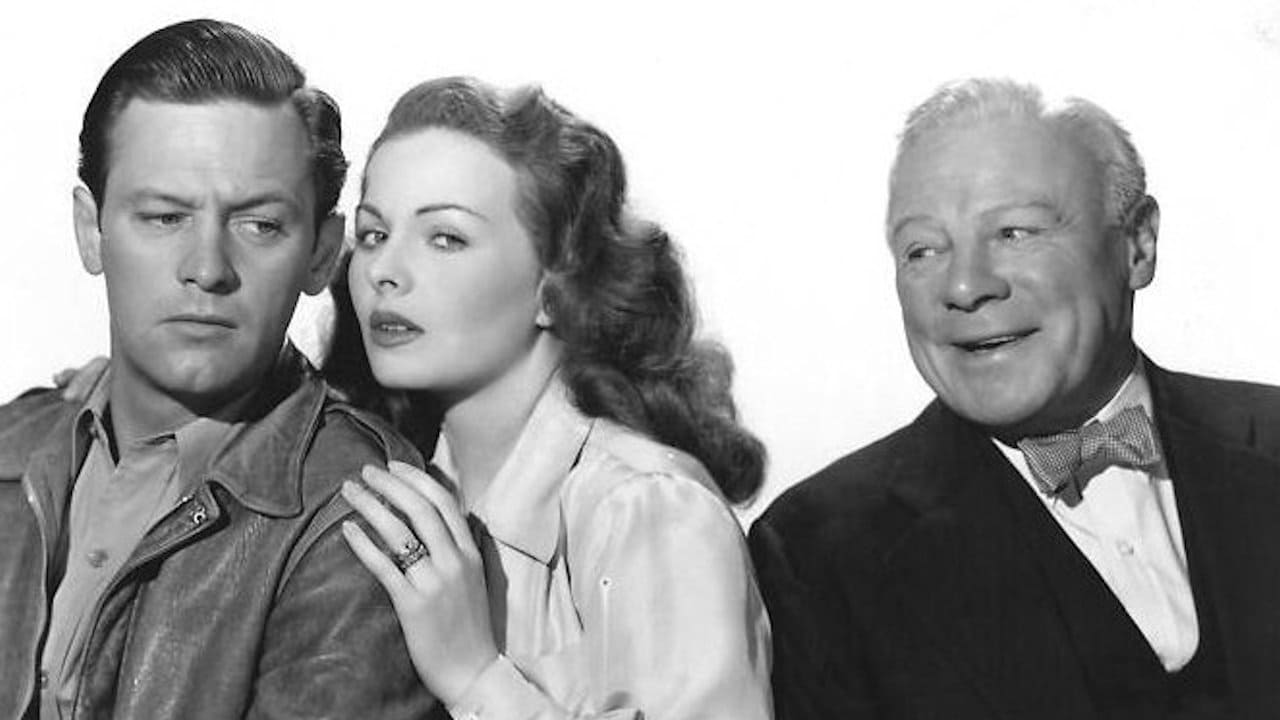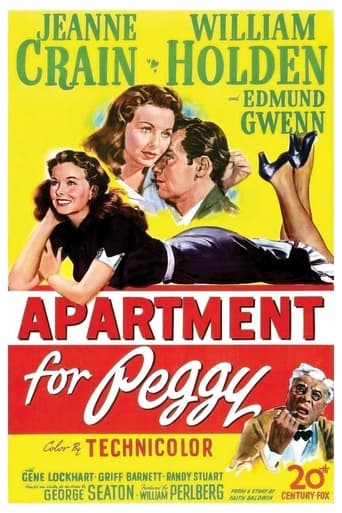



Lack of good storyline.
Great story, amazing characters, superb action, enthralling cinematography. Yes, this is something I am glad I spent money on.
View MoreThe tone of this movie is interesting -- the stakes are both dramatic and high, but it's balanced with a lot of fun, tongue and cheek dialogue.
View MoreThere is definitely an excellent idea hidden in the background of the film. Unfortunately, it's difficult to find it.
View MoreI really wasn't expecting much from this film; the description sounded rather mundane. But what I discovered was a film with more depth than one might expect, and it's utterly charming.It's the story of a retired college professor (Edmund Gwenn) who, after he finishes his book, is going to commit suicide. Then, as it is right after the war, Peggy (Jeanne Crain) and her husband (William Holden) comes into the professors life as she sort of forces their way (in an innocent way) into his attic as a temporary apartment. Essentially, the film is about them becoming a family.While Jeanne Crain is billed as star, along with William Holden, make no mistake, this is very much Edmund Gwenn's film. It's just a year after his wonderful role as Santa Claus in "Miracle On 34th Street", and although that is his signature film, I'm not sure that he isn't even better here. Jeanne Crain is Peggy, of course, but she seems different here...not sure quite how to explain it. But she is as lovely and wholesome as ever. William Holden doesn't have much to do in the first half of the film, but has more scenes in the latter half of the movie. The supporting actors all do their parts satisfactorily, but none get enough screen time worth mentioning...although you'll recognize some favorite faces in the character actors (including Gene Lockhart).The gist of the story, in a sense, is how people cope with the everyday issues of their lives. It's really quite charming and tells you quite a bit about post World War II America and college. Recommended.
View MoreJeanne Crain and Edmund Gwenn give heartwarming performances in this 1948 film. Trouble is that Crain's movie husband, William Holden, of all people, is terribly miscast here. He is far too mature for the part, and at times, you would think he is doing a take-off on Walter Denton,(Richard Crenna) of "Our Miss Brooks Fame." It is only when the film takes a serious tone that Holden's acting improves. As in the case with Dana Andrews, comedies or musicals were not the strength of Holden.The writing is quite good here. A retired philosophy professor contemplates suicide until he meets up with a struggling young couple, Crain and Holden, the latter a G.I. going to college on the G.I. bill.The movie does do well in highlighting the problems of a housing shortage and the young married couples, where the husband is in college. I especially liked the part where Gwenn tries to educate the women philosophically speaking. Was this, however, a put-down on women's educational experience?Totally unrealistic was when those college professors try to get Holden through the make-up exams.
View MoreBehind the misleadingly sappy title lies one of the decade's most positive and humorously enriching films. On the surface, the story is about the post-war housing shortage and the difficulties returning vets had in trying to start a family in old trailers, quonset huts, or whatever lodging could be slapped together. Peggy (Jeanne Crain) is a charmingly spunky newly-wed whose husband (William Holden) is in college on the GI Bill. There she meets stodgy old professor (Edmund Gwenn) and tries to talk her way into making his attic a new home for the couple and their expected baby. The trouble is Gwenn has turned his big old house into a mausoleum in tribute to his dead wife. Now he lives alone, in despair. Having completed his life's work he sees no further point in living and thus looks forward to suicide. In the process, however, he fails to factor in the life-affirming powers of youthful zest, old-age wisdom, and the wonderfully spirited Peggy.What a fine piece of obscure film-making, from scripter-director George Seaton and the cast of three principals, though Crain is a bit much at times. The film must have cost about 50 bucks to make since nearly all the scenes are indoors, but seldom has movie-making money been better spent. Beneath the post-war plot, there's a parable about generational sharing in which each age group brings uniquely enriching benefits to those around them. Thus, Peggy brings hope, joy, and a real home to the others, while husband Holden, though sometimes wayward, brings dedication, hard work, and finally a sense of real values. And as the ivory-tower professor, Gwenn contributes from the wisdom of the ages, but also finds that true philosophical thinking lies not on the dead pages of old books, but can also be found in the unlikeliest of places-- in a launderette full of seemingly empty-headed young wives. That superbly humane scene alone is worth the 90 minutes of watching.A movie like this could have gone off-track in so many places. The material alone might easily have slid into the sort of tear-jerking treatment that would send me running for the off-button. But never do the on-screen results descend to a sappy level. Instead Seaton and Co. maintain a consistently light and intelligent touch throughout, even during the darker passages. In fact, they accomplish one of the most difficult of all challenges inside an industry where cynicism is the norm and sneering is the response to any hint of idealism. To its great credit, the film actually makes us feel that beneath our differences, something like a harmonious human community may exist after all, as the wonderfully metaphorical last scene suggests. I expect a little project like this with its unfortunate title passed quickly into movie oblivion. However, now more than ever, Apartment for Peggy needs rediscovery. For its well-delivered message is truly trans-generational.
View MoreI've almost always enjoyed the performances of actor Edmund Gwenn. Generally-speaking he was a fun guy to watch and was excellent in comedies. He had a unique voice, too. This was the most unusual role I ever saw him play, and I can't say I appreciated it, although he was interesting, as always.It was kind of eerie to see him play a man who was contemplating suicide and then attempting to rationalize his act. From a secular viewpoint, some of it made sense. He was through with his job and felt he had done everything he wanted to do in life, so why not end it all before sickness and disease set in? Sounds good on the surface, but is a very selfish outlook, of course. I won't get into the arguments against that here but it would make for interesting discussions.What turned me off in this film wasn't Gwenn but Jeanne Crain's character "Peggy." She talked non-stop. Puh-leeze....give my ears a break! Maybe that non-stop chatter was supposed to be funny but I found it only one thing: annoying. That yak-yak-yak act wore thin quickly and I would think it would drive anyone crazy. I know it drove me to finally take the tape out of the VCR and tape some other film over it.
View More